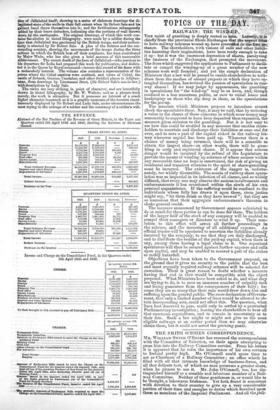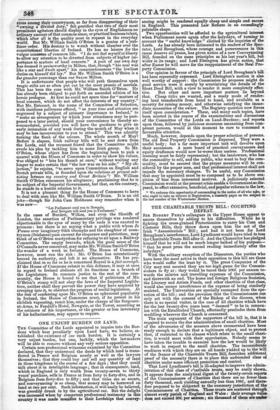THE SMITH O'BRIEN CORRESPONDENCE..
Mn. WILLIAM SMITH O'BRIEN has resumed the correspondence with the Committee of Selection, on their again attempting to press him into the Railway Committee service. From his letters it is apparent that he rates the importance of his own services to Ireland pretty high. Mr. O'Connell could spare time to act as Chairman of a Railway Committee ; an office which he filled with all that intimate knowledge of business-forms, and all that delicate tact, of which no man possesses a greater share, when he pleases to use it. Mr. John O'Connell, too, has dis- tinguished himself as a sensible and laborious member of a Rail- way Committee. Neither of these gentlemen is, or would like to be thought, a lukewarm Irishman. Yet both found it consistent with devotion to their country to give up a very considerable portion of their time and energies to duties which devolved upon them as members of the Imperial Parliament. And all thejudi- cious among their countrymen, so far from disapproving of their "owning a divided duty," felt gratified that two of their most prominent agitators should display in the eyes of Englishmen no ordinary amount of that common sense, or practical business talent, which after all is the quality most in request in the everyday world. But Mr. William Smith O'Brien is a genius of a ;sub- limer order. His destiny is to watch without slumber over the constitutional liberties of Ireland. He has no leisure for the vulgar concerns of common life. "I do not feel myself at liberty to allow my attention to be diverted from subjects of higher im- portance to matters of local concern." A poet of our own day has deemed it praiseworthy in Milton, that, though "his soul was like a star and dwelt apart," his conscientiousness "the lowliest duties on himself did lay." But Mr. William Smith O'Brien is a far grander personage than our Saxon Milton. It is unfortunate that people who will perk themselves upon tragic stilts are so often put out by the most prosaic of mortals. This has been the case with Mr. William Smith O'Brien. He has already been obliged to put forth an amended edition of his heroic prologue. At first he could not spare time for "matters of local concern, which do not affect the interests of my country." But Mr. Estcourt, in the name of the Committee of Selection, with insidious politeness offered, "as your time and attention are engrossed by a subject of primary importance to Ireland," to "make an arrangement by which your attendance may be post- poned to a later period, should your convenience be thereby ac- commodated, provided you will have the goodness to give an early intimation of any week during the month of May when it may be less inconvenient to you to attend." This was adroitly turning the flank of the excuse. The whole month of May! Before it elapses, Irish railway bills will be sent down from the Lords, and the recusant feared that the Committee might evade his plea by tackling him to some Irish group. So Mr. O'Brien, whose object has from the beginning been to pick a quarrel with the House of Commons in order to show his valour, was obliged to "bite his thumb at once," without waiting any longer to make certain that "the law was on his side." "My ob- jection," he rejoins, "to serve upon Committees on English and Scotch private bills, is founded upon the relations at present sub- sisting between my country and Great Britain"! Mr. William Smith O'Brien renounces his allegiance ; proclaiming that he is no subject of the Imperial Government, but that, on the contrary, he stands in a hostile relation to it.
It is not a pleasant thing for the House of Commons to have to deal with men like Mr. William Smith O'Brien. It is an old joke—though Sir John Cam Hobhouse may remember when it was new—
"Let Parliament send you to Newgate, And Newgate will send you to Parliament."
In the cases of Burdett, Wilkes, and even the Sheriffs of London, the assertion of Parliamentary privilege was rendered objectionable in the eyes of many by the ends it was exerted to promote : but there is no saying what a public with whom lo Pecans over imaginary Sikh triumphs and the slaughter of coun- trymen (Irishmen) pass current for eloquence and patriotism, may think of an O'Brien martyrdom for refusing to sit upon a Railway Committee. The empty bravado, which the good sense of the O'Connells never conceived, may make Mr. William Smith O'Brien the wonder of a week in Ireland. The House of Commons, however, must run the risk : Mr. O'Brien has ostentatiously braved its authority, and left it no alternative. He has pro- claimed that in so far as he is concerned Repeal is a fait accompli. If the House of Commons submit to this defiance, it may at once in regard to Ireland abdicate all its functions as a branch of the Legislature. In common justice to the rest of the com- munity, the House is bound to see that if politicians of Mr. O'Brien's stamp will not obey the laws of the Imperial Legisla- ture, neither shall they pervert the power they have acquired by creeping into it, to obstruct the progress of useful legislation. At the risk of conferring upon Mr. O'Brien an ephemeral popularity in Ireland, the House of Commons must, if he persist in his childish vapouring, remit him, under the charge of the Sergeant- at-Arms, to Fendall'a Hotel, Newgate, or the Tower, according as the estimate of his importance, or the greater or less inveteracy of his hallucination, may appear to require.



























 Previous page
Previous page